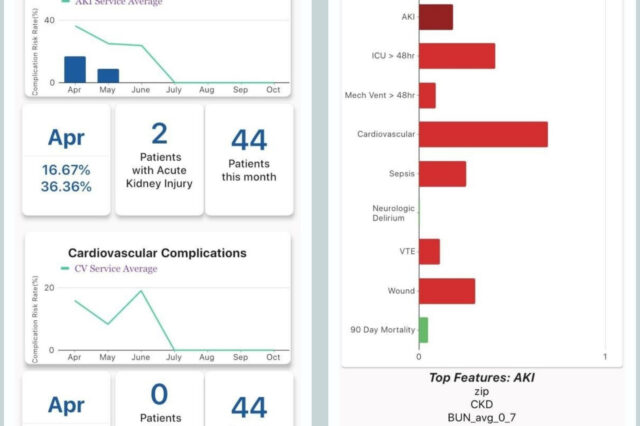- Investigator
- Azra Bihorac
- Status
- Accepting Candidates
Delirium
Definition
Delirium is sudden severe confusion due to rapid changes in brain function that occur with physical or mental illness.
Alternative Names
Acute confusional state; Acute brain syndrome
Causes
Delirium is most often caused by physical or mental illness and is usually temporary and reversible. Many disorders cause delirium. Often, these do not allow the brain to get oxygen or other substances. They may also cause dangerous chemicals (toxins) to build up in the brain. Delirium is common in the intensive care unit (ICU), especially in older adults.
Causes include:
- Alcohol or medicine overdose or withdrawal
- Drug use or overdose, including being sedated in the ICU
- Electrolyte or other body chemical disturbances
- Infections such as urinary tract infections or pneumonia
- Severe lack of sleep
- Poisons
- General anesthesia and surgery
Symptoms
Delirium involves a quick change between mental states (for example, from lethargy to agitation and back to lethargy).
Symptoms include:
- Changes in alertness (usually more alert in the morning, less alert at night)
- Changes in feeling (sensation) and perception
- Changes in level of consciousness or awareness
- Changes in movement (for example, may be slow moving or hyperactive)
- Changes in sleep patterns, drowsiness
- Confusion (disorientation) about time or place
- Decrease in short-term memory and recall
- Disorganized thinking, such as talking in a way that doesn't make sense
- Emotional or personality changes, such as anger, agitation, depression, irritability, and overly happy
- Incontinence
- Movements triggered by changes in the nervous system
- Problem concentrating
Exams and Tests
The following tests may have abnormal results:
- An examination of the nervous system (neurologic examination), including tests of feeling (sensation), mental status, thinking (cognitive function), and motor function
- Neuropsychological studies
The following tests may also be done:
- Blood and urine tests
- Chest x-ray
- Cerebrospinal fluid (CSF) analysis (spinal tap, or lumbar puncture)
- Electroencephalogram (EEG)
- Head CT scan
- Head MRI scan
- Mental status test
Treatment
The goal of treatment is to control or reverse the cause of the symptoms. Treatment depends on the condition causing delirium. The person may need to stay in the hospital for a short time.
Stopping or changing medicines that worsen confusion, or that are not necessary, may improve mental function.
Disorders that contribute to confusion should be treated. These may include:
- Anemia
- Decreased oxygen (hypoxia)
- Heart failure
- High carbon dioxide levels (hypercapnia)
- Infections
- Kidney failure
- Liver failure
- Nutritional disorders
- Psychiatric conditions (such as depression or psychosis)
- Thyroid disorders
Treating medical and mental disorders often greatly improves mental function.
Medicines may be needed to control aggressive or agitated behaviors. These are usually started at very low dosages and adjusted as needed.
Some people with delirium may benefit from hearing aids, glasses, or cataract surgery.
Other treatments that may be helpful:
- Behavior modification to control unacceptable or dangerous behaviors
- Reality orientation to reduce disorientation
Outlook (Prognosis)
Acute conditions that cause delirium may occur with long-term (chronic) disorders that cause dementia. Acute brain syndromes may be reversible by treating the cause.
Delirium often lasts about 1 week. It may take several weeks for mental function to return to normal. Full recovery is common, but depends on the underlying cause of the delirium.
Possible Complications
Problems that may result from delirium include:
When to Contact a Medical Professional
Contact your health care provider if there is a rapid change in mental status.
Prevention
Treating the conditions that cause delirium can reduce its risk. In hospitalized people, avoiding or using a low dosage of sedatives, prompt treatment of metabolic disorders and infections, and using reality orientation programs will reduce the risk of delirium in those at high risk.
Gallery


References
Guthrie PF, Rayborn S, Butcher HK. Evidence-based practice guideline: delirium. J Gerontol Nurs. 2018;44(2):14-24. PMID: 29378075 www.ncbi.nlm.nih.gov/pubmed/29378075/.
Inouye SK. Delirium in the older patient. In: Goldman L, Schafer AI, eds. Goldman-Cecil Medicine. 26th ed. Philadelphia, PA: Elsevier; 2020:chap 25.
Mendez MF, Yerstein O. Delirium. In: Jankovic J, Mazziotta JC, Pomeroy SL, Newman NJ, eds. Bradley's and Daroff's Neurology in Clinical Practice. 8th ed. Philadelphia, PA: Elsevier; 2022:chap 4.
Related specialties
Our experts
Clinical Trials: Delirium
UF Health research scientists make medicine better every day. They discover new ways to help people by running clinical trials. When you join a clinical trial, you can get advanced medical care. Sometimes years before it's available everywhere. You can also help make medicine better for everyone else. If you'd like to learn more about clinical trials, visit our clinical trials page. Or click one of the links below:
News and Patient Stories: Delirium
UF researchers’ artificial intelligence platform accurately predicts surgical complications
June 1, 2022
Complications after surgery can pose many challenges for both physicians and patients. Now, University of Florida researchers have confirmed their artificial…
AI at UF, Department of Anesthesiology, Department of Surgery, +3 more

Artificial intelligence in the intensive care unit: UF researchers developing novel solutions
November 10, 2021
In the intensive care unit of the future, a patient’s pain level will be captured through visual cues such as body movement and facial expressions. Sensors…
AI at UF, College of Medicine, +2 more

Latest podcast episodes
COVID-19 patients at risk of falling into delirium
COVID-19 patients isolated in their hospital rooms face a difficult road. Now, imagine that same room for an elderly patient in cognitive decline or suffering from dementia or Alzheimer’s...
Delirium and urinary tract infection
Confused thinking, disordered speech and other symptoms of delirium in an older adult could cause loved ones to suspect dementia. But these symptoms could actually stem from a fairly common...
